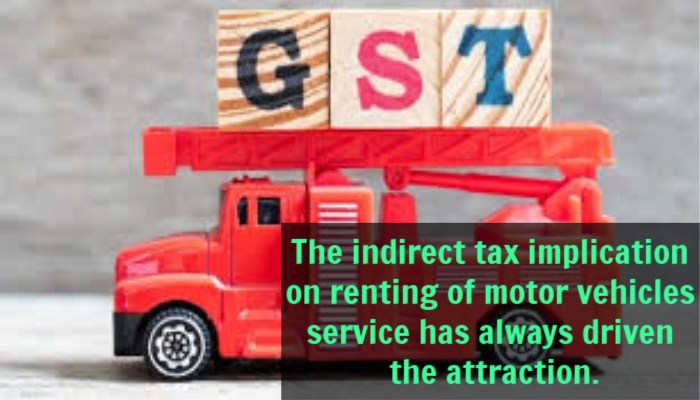It has been noticed that there is a lot of confusion regarding the GST implication on the motor vehicle because of its complication in the law. Even a lot of professional has a contradictory view regarding the taking of ITC on renting of a motor vehicle. In this article, we will discuss, almost all of the queries that you may occur related to the GST implication on the renting of motor vehicle services.

Here, we are discussing the renting of a motor vehicle which is being used for the carriage of passengers.
Understanding GST on renting of motor vehicle services
The GST rates on renting of motor vehicle services have already been prescribed under notification no.11/2017-Central Tax (Rate) dated 28.06.2017, and the same is being explained below:
| Description of Service | GST rates | Conditions |
| Renting of a motor vehicle which is designed to carry passengers (wherein service receiver shall pay the cost of fuel) | CGST–2.5%
SGST–2.5% Total–5% |
Provided that input tax credit charged on goods and services shall be used in supplying the services which have not been taken.
However, an input tax credit can be availed on the input services in the same line of business. |
| Or | ||
| CGST–6%
SGST–6% Total–12% |
NIL | |
| Rental services of transport vehicle (with or without operators) | CGST–9%
SGST–9% Total–18% |
NIL |
As per the above-referred notification, the motorcar service provider can have the following two options, in terms of GST rates:
To pay GST @5%, wherein, the credit of input tax shall not be available (an input tax credit of only input service of the same business line can be availed); or
To pay GST @12%, wherein, the credit of input tax is available.
Reverse Charge Mechanism
The concept of the renting of motor vehicle services has covered within the ambit of ‘Reverse Charge Mechanism’ vide notification no. 22/2019 – Central Tax (Rate) dated 30th September 2019. From 1st October 2019, the reverse charge mechanism under the renting of motor vehicle service has become effective.
As per S.No.15 to notification no. 22/2019–Central Tax (Rate), the provisions relating to reverse charge mechanism as applicable to renting of motor vehicle service, which is explained hereunder:
| Description of service | Service Provider | Service Receiver |
| Service provided by way of ‘renting of a motor vehicle’ | Any person is other than body corporate paying CGST, i.e. CGST at the rate of 2.5% and availing the credit of input tax of only input service which is in the same line of business. | Any body corporate (located in the taxable territory) |
Now, let’s discuss the provision in a simple manner:
Here, the service specified above is “Renting of Motor Vehicle”
It is to be noted that the Service provider can be any person but other than a body corporate. Here a question arises that why the body corporate has been excluded from this.
As you know that the government has applied the RCM on those supplies in which the government does not have control of the supplier or they are working in the unorganized market. The same situation shall be applicable here. It is difficult for the entities to control other than body corporate because body corporates have to comply with any provisions under this act and other laws.
The service provider has no right to avail any credit of Input tax other than the input tax credit on input service in the same line of business; and
Service is received by a body corporate.
If all the above criteria are satisfied, then the service receiver shall be liable for the payment of GST under the reverse charge mechanism.
Similar reverse charge provisions are also covered under the state tax, i.e. SGST. Further, it should be noted that the word ‘Body Corporate’ has the same meaning as assigned to in section 2 (11) of the Companies Act, 2013, i.e.
- A Company.
- Limited Liability Partnership.
- Any company/corporation incorporated outside India.
- Service Receiver–A registered person located in the taxable territory.
Different Situation for better understanding:
The GST provisions as applicable to renting of a motor vehicle are being summarized which are as follows:
| Service provider | Service Receiver | Reverse charge mechanism | GST rates |
| Any person other than body corporate | Body Corporate | Since, All of the required conditions are satisfied, and hence GST is payable by the service receiver under the Reverse Charge Mechanism | 5% |
| A body corporate (not availing any input tax credit) | Body corporate | Although the service provider is a body corporate they are not availing the ITC, hence RCM shall be applicable | 5% |
| A body corporate (not availing any input tax credit) | Non-Body corporate | Although, the service provider is a body corporate the service received is not a body corporate entity. Hence, here forward charge Mechanism shall apply. | 5% |
| A body corporate (availing input tax credit of input service of the same business line) | Any | Not applicable | 5% |
After understanding the above, you may know that the service provider has the option to pay GST @12% by availing full input tax credit. However, practically with the introduction of the reverse charge mechanism (RCM) on renting the motor vehicle, now the service provider has no option left to pay GST @12% by availing full input tax credit. After reverse charge introduction, the service provider is left with only one option, i.e. to pay GST @5% without availing input tax credit

1 thought on “GST Implication on Renting of Motor Vehicle”